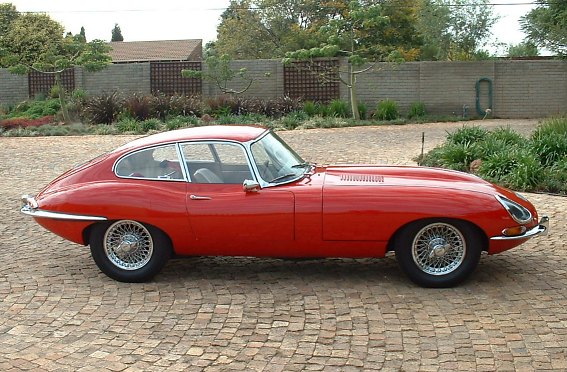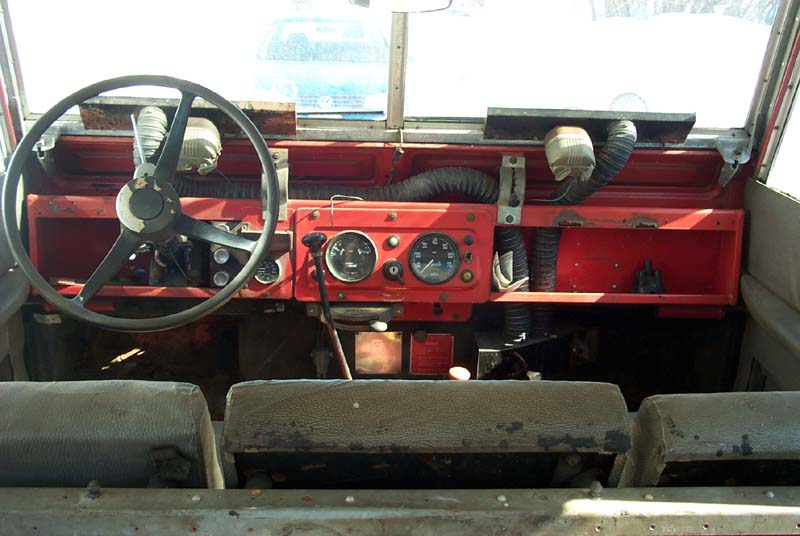My brother used to work for Mercedes, I would not call them worker friendly at all, nor are they as quality oriented as you might expect.
My brother used to work for Mercedes, I would not call them worker friendly at all, nor are they as quality oriented as you might expect.
Keith wrote:Dr. Hess wrote: Man sitting in a MGTD or something similar, broke down: What's wrong with it? Mechanic: Well, the problem is the English would rather spend money glueing wood on the dashboard than designing an electrical system that works.Wasn't the dashboard in a TD actually wood, not metal with wood glued to it? I have more glued-on wood in my US and German cars than in all my British ones
It was actually plywood covered in vinyl. Of course, they had a fancy name for the vinyl, which I think was Rexene. Many owners replaced it with some sort of wood.
racerdave600 wrote: My brother used to work for Mercedes, I would not call them worker friendly at all, nor are they as quality oriented as you might expect.
Ask the wife, who was stranded when her C series decided it no longer enjoyed having transmission fluid and peed it all out. Twice.
One of the crappiest interiors I've seen in a car. All the knobs on the A/C vents fell off, along with the plastic trim on the door fitments, etc.
Was a fun driving car with the Kompressor, but we sold it and bought a C5 Corvette that we found more reliable and a blast to drive.
I don't know whether to blame the British or the Germans for the problems I have with my '07 Mini, but I certainly blame the Mexicans that own the dealership where I bought the thing. They are trying to weasel out of replacing my $1000 fuel pump under warranty. Great, an "economy" car with BMW repair costs. Just what I was counting on.
Basil Exposition wrote:Keith wrote:It was actually plywood covered in vinyl. Of course, they had a fancy name for the vinyl, which I think was Rexene. Many owners replaced it with some sort of wood.Dr. Hess wrote: Man sitting in a MGTD or something similar, broke down: What's wrong with it? Mechanic: Well, the problem is the English would rather spend money glueing wood on the dashboard than designing an electrical system that works.Wasn't the dashboard in a TD actually wood, not metal with wood glued to it? I have more glued-on wood in my US and German cars than in all my British ones
So the British were actually trying to figure out how to stick other things to wood. Makes perfect sense.
I've never understood the British inability to come to grips with fluids, either keeping them in or keeping them out. Wasn't the British Empire built on their navy? How did they not sink?
Ironically, of the 15 or so cars I've owned over my lifetime (to include several Hondas/Acuras, Nissans, Subarus, a BMW, a Chrysler, and a Jeep, there is only ONE that has never, not once, left me by the side of the road:
My 1970 Triumph GT6. Sure, little things went wrong. Maybe the headlights don't want to turn on. Maybe the speedo stopped working. But never "didn't get me there."
EDIT: Also our 2008 4Runner with 13k miles on it has never broken down either
And I'm religious about maintenence.
I think the only ones of mine that have stranded me were my beater Subaru that was almost up to 200k miles, and the Seven when I was still working out the kinks and had a radiator failure. Oh, and the Mini failed to proceed after a hot lap session at the track. And a V8 Miata once had an aftermarket head fail on the track.
So let's see, that's Japan, England, the USA and my own garage. I haven't owned a German car long enough yet.
I'm not talking about modern mercedes, but they probably made the best cars in the 70's. My car had a recall issue with the subframe which was addressed in 2005, mercedes replaced it under warranty. My car has 130k miles on it and aside from maintanence I don't think the high mileage 155k mile badge is too far away. I'm sure you could have recall work done on a british car, right? Oh yeah they are all dead. I think the chinese got the MG/ rover nameplate.
I'm not going to say mercedes is faultless but look at how many old mercedes are still on the road. If I need a part for my car I can go to the dealer and they still stock parts for my 1978. The only part that was NLA was a steering bump stop. When was the last time you saw an mg or triumph up and running? I actually just saw one driving down to the store, but that doesn't count. I read an article about either the tr stag or sunbeam and it sounds like the testing was left up to the customer.
When you consider that there was union sabatage combined with lack of quality control is it any wonder there aren't any independent british auto manufacturers left?
Keith wrote: I think there was one really big plus to Lucas: standardization. Wiring colours were consistent from car to car and so were many parts like lights, switches and wiper motors.
I was really surprised when reading your locost book and discovering that you powered your wipers with parts from British cars. The phrase "British electronics" strikes fear in my heart.
don't throw the brits under the bus. Sure they have done some whacked out things but...




The list of cool cars goes on and on...
Too bad you can't drive them at night cause the headlights are dodgy. :-)
Don't throw the argyle in with the SD1... they are only similar in looks..
I have only ever needed a car towed once.. and that was a fiat that had an aftermarket balljoint fail in a rather spectacular way (the use had a HUGE batch of them in the late 80s and 90s.. I hope they are all gone now) my BMW is as reliable as gravity. The Sprite and Mini I had were both great little cars. Their simplicity made them easy to fix on the side of the road.
I do understand the union thing.. probably more so than most people as I am a Union Member (IATSE 77) and have seen both the good and the bad in the same day.. but those British Leyland workers just had their heads so far up their asses they were in danger of imploding and disappearing forever
Ignorant:
Actually, the cars you show are a good example of why the Brits ended up under the bus all on their own. Those cars represent the culmination of British technology. The styling was great and marketing worked. However, all they really were was 30 year old (or older) technology that had been assembled in an admirable fashion.
With no real research having been conducted to advance the cause, there was no place to go but downhill.
JoeyM wrote:Keith wrote: I think there was one really big plus to Lucas: standardization. Wiring colours were consistent from car to car and so were many parts like lights, switches and wiper motors.I was really surprised when reading your locost book and discovering that you powered your wipers with parts from British cars. The phrase "British electronics" strikes fear in my heart.
Have you ever seen a Lucas wiper system? They're very flexibly designed and can be adapted to just about any car. It's a prime example of that standardization of design I was talking about - instead of having to come up with a wiper linkage that is unique to every car, you simply take the Lucas system, mount the appropriate wheel boxes where you need them, find a place to stash the motor and then hook them together with hard fuel line with a cable inside. Any shop that stocks parts for British cars only needs one design of wiper motor and a couple of different wheel boxes and arms, not the unique parts for every car as required for most of the stuff on the road. Quite nicely done, really.
I used them on my Locost just like every Lotus Seven did. It's a good solution. My Mini shares the same parts, as do the two MGBs. If my Land Rover were a year or two newer, it would also have the same system.
Keith wrote:JoeyM wrote:Have you ever seen a Lucas wiper system? They're very flexibly designed and can be adapted to just about any car.Keith wrote: I think there was one really big plus to Lucas: standardization. Wiring colours were consistent from car to car and so were many parts like lights, switches and wiper motors.I was really surprised when reading your locost book and discovering that you powered your wipers with parts from British cars. The phrase "British electronics" strikes fear in my heart.
No, I haven't looked at them. I will definitely do so when I start trying to figure out how to set up the single wiper on the locost-datsun-replica-thingy.....
For a single wiper, it's a lot easier. The wipers on my old Rover are actually a good option there, and they look awesome when polished. One motor per blade, bolted right to the windshield frame. I think a lot of the Model T-type cars use something similar, so hot rod catalogs will be your friend.

Does anyone recall the story of the britishish (oem) auto parts supplier that was tried and convicted in the british courts for knowingly suppling bad gaskets and seals to B/L for years? I remember reading the story about 10 years ago in auto week or some other US car mag. I tried googleing it yesterday, but couldn't find anything.
benzbaron wrote: I don't know about the british wiring, but that sounds mostly like user ignorance rather than outright incompetance.
Go buy a mid 80s jag with wiring problems. If you can fix any of the problems within the course of a day, I won't think less of you for this comment, if not, then your statement is that of one who is ignorant to the fact of craptacular british electrics.
My 1978 Jaguar,, as far as very good mechanical engineering the best,,but as far as electrical engineering the worst.
talkin to UK mechaniks, they say all about B/L and unions, and the archaic government.
reasons like that is why every so often you need a rev.
Keith wrote: For a single wiper, it's a lot easier. The wipers on my old Rover are actually a good option there, and they look awesome when polished....I think a lot of the Model T-type cars use something similar, so hot rod catalogs will be your friend.
Thanks (again), Keith. I appreciate the advice.
I think that is why ford bought jaguar, so they could work our all the kinks. Once ford made jaguars dependable they lost their "british charm" so to speak.
I hear mercedes from the 90s used pretty bad wiring, I hear it was some environmental issue where the german goverment required cars to use biodegradable wiring. I guess the wiring did biodegrade, but before the car was scrapped.
I have never messed with a british car or bike, but legend preceeds them. I agree that standardization is great, but if someone doesn't understand that US and british systems aren't the same they might end up making a mess of stuff.
I've seen a couple old jags since I made that cavalier comment about "how many old brit cars do you see up and running?"
My future-wife's father has a mid-60s MBG and a later MGB GT and he hasn't had that many problems with them mechanically or electrically. Like a lot of cars with a similar reputation, if you put forth that last 5% of effort in maintenance, they will surprise you.
ignorant wrote: Too bad you can't drive them at night cause the headlights are dodgy. :-)
'A gentleman does not motor about after dusk'. ![]()
NOHOME wrote: Actually, the cars you show are a good example of why the Brits ended up under the bus all on their own. Those cars represent the culmination of British technology. The styling was great and marketing worked. However, all they really were was 30 year old (or older) technology that had been assembled in an admirable fashion. With no real research having been conducted to advance the cause, there was no place to go but downhill.
Ehhhh, not sure I completely agree. Been around a lot of LBC's over the years, and the Mini is the first one I've owned. My impression is thus: The British had some ingenious designs, frequently created with little in the way of new componentry due either to frugality or the unwillingness of the manufacturer to spend proper funds on newer base equipment. Execution in design was frequently pretty good (wiper linkage cited above), but construction was frequently lackluster. My Mini is an absolutely brilliant design, but it so shoddily built (though mostly dependable) anyone with any sense wouldn't expect it to last more than 5-7 years from new.
From my 20-odd years playing with Italian cars, I can say they make beautiful cars and castings and can build engines of any given size that always make more power than those from other continents of comparable displacement, but most of the pieces are made of often fragile materials that are better looked at than used.
The Germans make cars mostly built to survive armageddon but often fail on the addition of anything beyond necessities, i.e. failing window regulators, speedometers, heater cores, radiators, etc. On a race track, though, I think the German cars can be flogged with no mercy, and make it to the end of the race, where Brit and Ital cars need to be treated with some sympathy.
The French design cars to push the envelope of design and creativity, but with no regard whatsoever that they may ever require servicing.
American cars are the class bullies of autodom. Big, burly, loud but frequently when pushed reveal their inherent flaws and inability to succeed against their lesser peers.
Asian cars are like major appliances. Generally well built, but with few user-servicable parts inside. They perform admirably, but in 20 years you won't fondly remember most of them any more than you do your last toaster oven.
benzbaron wrote: I hear mercedes from the 90s used pretty bad wiring, I hear it was some environmental issue where the german goverment required cars to use biodegradable wiring. I guess the wiring did biodegrade, but before the car was scrapped.
I've wondered about that, as BMWs from the era don't suffer from nearly as many wiring problems (although a few particular parts apparently can get bitten by this bug). It could have been the German government required manufacturers to make a certain percent of the car from biodegradeable materials, and Mercedes chose it for the wiring instead of other parts.
ddavidv wrote:NOHOME wrote: Actually, the cars you show are a good example of why the Brits ended up under the bus all on their own. Those cars represent the culmination of British technology. The styling was great and marketing worked. However, all they really were was 30 year old (or older) technology that had been assembled in an admirable fashion. With no real research having been conducted to advance the cause, there was no place to go but downhill.Ehhhh, not sure I completely agree. Been around a lot of LBC's over the years, and the Mini is the first one I've owned. My impression is thus: The British had some ingenious designs, frequently created with little in the way of new componentry due either to frugality or the unwillingness of the manufacturer to spend proper funds on newer base equipment. Execution in design was frequently pretty good (wiper linkage cited above), but construction was frequently lackluster.
Leaving out the bit about build quality. I think we are saying the same thing? The brits were doing some neat cars using obsolete technology. The downfall of the industry was that they let the development pipeline run dry. That is a very difficult situation to recover from. The US did the same and it caught up in the 70s. Recent events prove that they are about to suffer the same fate as the British builders due to this oversight.
The wipers that everyone keeps mentioning are a POS even by 1960s standards. Yes they fit every car the brits built and yes they were cheap to make, but they are noisy and problematic in that they tend to leak where they exit the cowl. They need to be removed cleaned and regreased every five years or so else they seize up. Great 1950s design. Lousy when put into a 1970s context, especially when the Japanese came along with fresh hardware and a commitment to develop it on an ongoing basis.
NOHOME wrote: Actually, the cars you show are a good example of why the Brits ended up under the bus all on their own. Those cars represent the culmination of British technology. The styling was great and marketing worked. However, all they really were was 30 year old (or older) technology that had been assembled in an admirable fashion. With no real research having been conducted to advance the cause, there was no place to go but downhill.
Isn't that a good description of GM in the 70s and 80s? Hell, even the 90s?
WE ARE GM. BUY IT OR ELSE.
You'll need to log in to post.